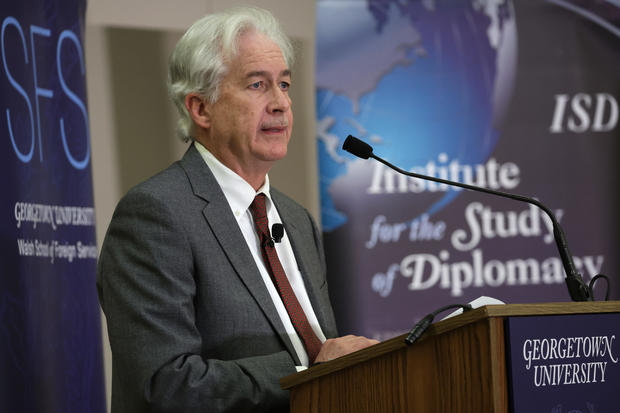CIA Director William Burns said Thursday that the next six months would be “critical” in the war in Ukraine with Russian President Vladimir Putin betting that waning Western interest and “political fatigue” could afford his military a new chance at making battlefield gains.
“Putin, I think, is betting right now that he can make time work for him,” Burns said. “The key is going to be on the battlefield in the next six months, it seems to us.”
“Puncturing Putin’s hubris, making clear that he’s not only not going to be able to advance further in Ukraine, but as every month goes by, he runs a greater and greater risk of losing the territory that he’s illegally seized from Ukraine so far,” he continued. “So this next period, I think, is going to be absolutely crucial.”
Getty Images
The career diplomat and former ambassador to Russia said Western intelligence showed Moscow was not interested in peace talks, despite occasional reports to the contrary.
“We do not assess that Putin is serious about negotiations, for all that you hear sometimes about that,” Burns said.
His remarks came amid continued warnings from Ukrainian officials that Russia was preparing to launch a significant offensive targeting the eastern part of the country, where missile attacks have already intensified this week. The war will enter its second year later this month.
Burns engaged in a moderated discussion at Georgetown University Thursday, where he was being awarded the Trainor Award for Excellence in the Conduct of Diplomacy. A former deputy secretary of state, Burns also served as ambassador to Jordan and worked during the Obama administration to start backdoor talks with Iran that paved the way for the 2015 nuclear deal.
On Thursday, he called the apparently deepening military ties between Russia and Iran “especially concerning.” Iran is known to have provided drones and relevant training to Putin’s forces in Ukraine.
Burns said that while he was in Kyiv for “30 hours or so” last month meeting with Ukrainian President Volodymyr Zelenskyy and his advisors, at least six of those hours were spent “in bomb shelters,” as Russian forces conducted two separate strikes on civilian targets using Shahed 136 Iranian unmanned aerial vehicles.
Of Iran, he said domestic instability driven by widespread demonstrations there had made Tehran’s regime “increasingly unsettled.”
“What’s going on internally is leading to more aggressive behavior externally,” he said.
“I do think as we look ahead to 2023 — and in my most recent trip, this was reinforced — the Middle East is going to reemerge as a particularly complicated set of challenges for American policymakers as well,” Burns said.
He spoke ominously of recent conversations he had in the region with Israeli and Palestinian leaders, which he said left him “quite concerned” about the potential for greater violence.
“A lot of what we’re seeing today has a very unhappy resemblance” to events preceding the Second Intifada more than two decades ago, he said. “I’m concerned about that.”
Burns also warned that the Russia-backed mercenary organization known as the Wagner Group was “expanding its influence” to a number of countries in Africa, including Mali and Burkina Faso.
“That is a deeply unhealthy development and we’re working very hard to counter it, because that’s threatening to Africans across the continent right now,” he said.
The CIA chief also said that China remains the “biggest geopolitical challenge” the U.S. faces in the decades ahead, calling competition with Beijing “unique in its scale.”
Chinese president Xi Jinping “doesn’t lack for ambition, but he’s not 10 feet tall,” Burns said. “He’s got a lot of challenges at home, whether it’s the zero COVID policy, which hasn’t gone as planned, economic growth figures — which could improve over the next few years — but have been historically low in recent years as well. We have a good hand to play, but we just have to play it systematically and thoughtfully.”
He said Xi was closely watching Putin’s experience in Ukraine and, while likely “unsettled” by Russia’s lackluster military performance, thus far remained “committed” to the partnership the two countries declared last year.
“But the truth is, there are actually some limits to it as well, simply because I think – as far as we can tell today, anyway – Xi Jinping and the Chinese leadership have been very reluctant to provide the kind of lethal weapons to Russia to use in Ukraine that we know the Russians are very much interested in,” Burns said.
Of Xi’s own regional ambitions, Burns said U.S. intelligence showed Xi had instructed the People’s Liberation Army to be prepared to conduct a successful military invasion of Taiwan by 2027.
“Now, that does not mean that he’s decided to conduct an invasion in 2027 or any other year, but it’s a reminder of the seriousness of his focus and his ambition,” Burns said.
